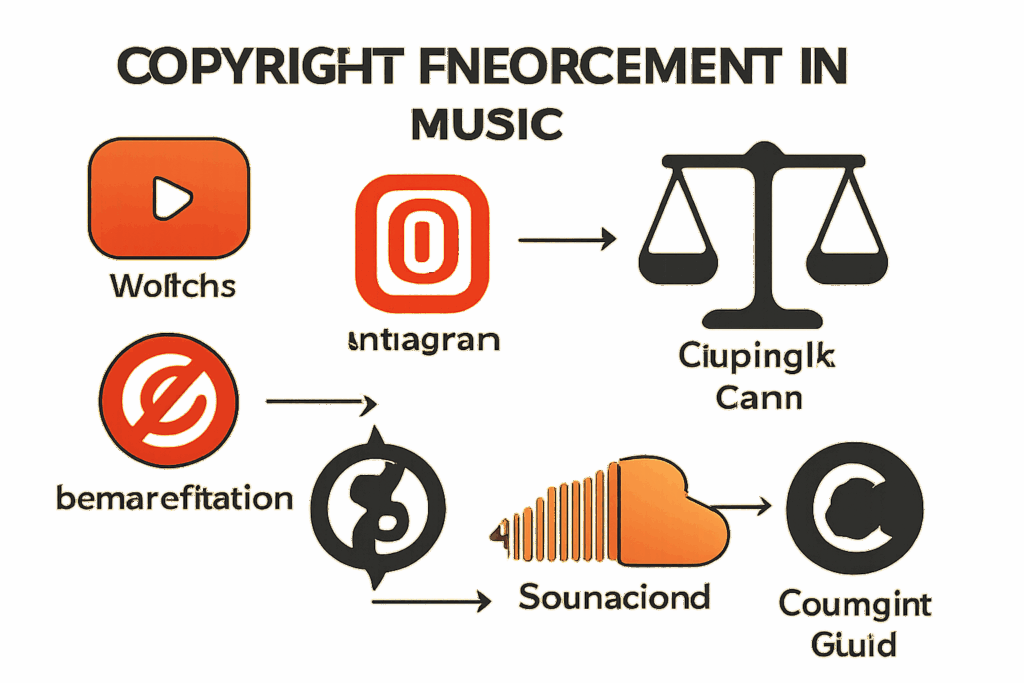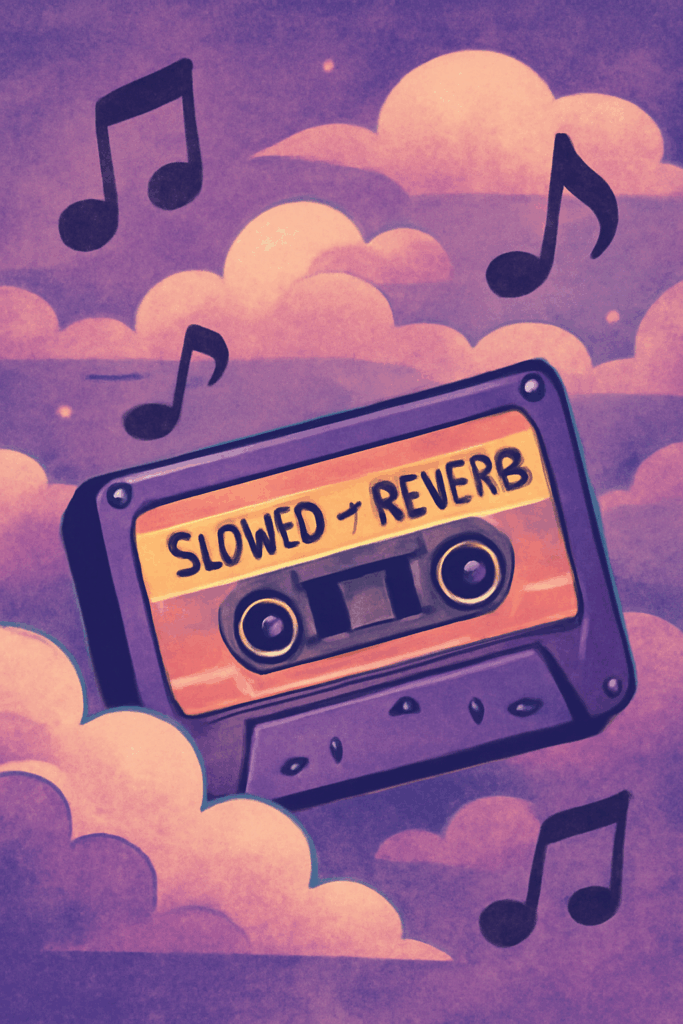Few trends have shaped the contemporary digital soundscape like slowed and reverb remixes. You’ve likely stumbled across these dreamy, melancholic reinterpretations of chart-toppers: a favorite pop song gently slowed down, with lush reverberation washing over every note, breathing new life and emotion into familiar melodies. For many, these edits have become staples for late-night sessions, chill playlists, or mood-driven TikToks.
But lurking beneath the surface of this seemingly innocent trend is a significant, and often confusing, legal debate: Are slowed and reverb songs copyrighted? Can anyone upload or monetize these versions without risk—or do these tracks invite legal trouble? If you’ve considered remixing and uploading your favorite tracks, or just wondered why some channels disappear overnight, you’re not alone. This post gathers legal explanations, firsthand Reddit experiences, and practical tips to demystify this hot topic.

What Is a Slowed and Reverb Song?
A slowed and reverb version is just what it sounds like: taking a song, slowing down its tempo, and adding reverb to the overall mix. The result is an atmospheric, spacious, and often more emotionally resonant take on the original. While the process sounds simple, the creative twist offered by slowed + reverb edits has led to a massive online community—and endless streams.
Core Legal Question: Does Slowing Down & Adding Reverb Remove Copyright?
Short answer: No. If the original song is copyrighted, so is the slowed and reverb edit.
Why?
- Copyright law protects the original recording and composition, not just the specific audio file or arrangement.
- Transformative use—a doctrine that allows certain creative reinterpretations—generally requires substantial change and new value, not merely technical modifications like speed or reverb adjustments.
- Platform content detection systems (like YouTube’s Content ID) are often able to recognize songs even when their tempo, pitch, or effects are altered.
Real Redditor Opinions
“It’s still illegal to use someone else’s lyrics or melodies without their permission. Slowing down/speeding up a song does still mean it’s copyrighted. It’s like saying it’s OK to upload a movie if you invert the colors.” – r/roblox
“Chopped and screwed music involves altering a copyrighted track by slowing it down, but this modification does not eliminate the original copyright.” – r/PartneredYoutube
Slowed + Reverb Edits: Copyright Law in Action
Can You Get Away With Posting Them?
Many creators ask why slowed and reverb uploads appear to survive on YouTube or SoundCloud. The answer is nuanced:
- Some uploads fly under the radar, especially when the channel is small or the rightsholder is lenient.
- Platforms may issue claims, not strikes: A copyright claim may result in demonetization or ad revenue being redirected to the copyright owner, rather than an immediate takedown or strike.
- Repeat offenses can get you banned: Multiple claims or strikes—especially from different rightsholders—are likely to lead to channel restrictions or termination.
Firsthand Reddit Experiences
- “If you uploaded say 10 videos and 4 people made claims on them, it would likely shut you down… They are getting ridiculous with some of the claims, I had a strike from someone on a song I had written and played as background… when I’m the copyright holder!” — r/youtube
- “Changing the tempo doesn’t free it of any infringement. Would you play a Beethoven song faster than usual and call it your own?” — r/roblox
- “YouTube’s Content ID system is generally effective at identifying songs, even when they’re covered. Shortened clips, altered speeds, or distorted sounds can still lead to claims unless the sample is made nearly unrecognizable.” — r/PartneredYoutube
Important Subtopics Explained in Detail
1. What Counts As Transformative Use?
The U.S. “fair use” doctrine makes exceptions in certain cases, such as parody, education, or substantial creative transformation. However, most slowed + reverb edits:
- Are not considered transformative enough under the law.
- Use large portions of the original track—lyrics, melody, and instruments—which keeps them within the original copyright.
- Would likely require a courtroom defense to assert their transformation, which is both risky and costly.
Legal test: Merely slowing or adding reverb is viewed by most platforms—and judges—as derivative, not transformative.
2. How Do Detection Algorithms Work?
YouTube’s Content ID and similar systems use waveform “fingerprints” to identify protected audio—even with minor modifications:
Most basic slowed + reverb edits do not get around these algorithms.
3. Monetization and Consequences
- Copyright owners control claims: Legally, only the copyright holder can decide whether to monetize, mute, block, or remove infringing videos.
- Monetization: Unless you have explicit rights or use royalty-free music, ad revenue won’t go to you.
- Channel risks: Repeated or egregious violations can mean bans or demonetization.
4. Licenses, Permission & Alternatives
To use a slowed or reverb edit safely:
- Obtain a sync license (for audiovisual uses).
- Use music in the public domain or under a Creative Commons license.
- Use sites and tools that guarantee copyright-free audio.
Table: Consequences of Uploading Slowed & Reverb Songs Without Permission
| Platform | Type of Violation | Typical Consequence | Monetization Allowed? |
|---|---|---|---|
| YouTube | Copyright claim | Demonitized, possibly blocked | No |
| YouTube | Copyright strike | Video removed; repeat offenses can lead to channel termination | No |
| Detected sample | Possible mute or removal | No | |
| SoundCloud | Detected sample | Removal/strike | No |
Real Reddit Community Insights
To add a human touch, let’s sample more comments and experiences:
“How do people upload slowed/reverb versions of songs without getting copyrighted?”
“Every time I attempt to upload, the copyright check indicates there’s copyrighted material, preventing anyone from viewing my video… I know others manage to bypass this issue, as I frequently enjoy similar content on YouTube. It’s a widespread trend. Can anyone offer some advice?” — r/questions
Responses generally confirm that uploading is technically illegal, but enforcement is inconsistent.
“Is it copyright violation if I play slowed+reverb songs, like The Weeknd, on Instagram Live?”
“Are you violating a copyright? Probably. The law in the USA says that unauthorized sampling is legal if its use is transformative. That means you need the money to prove in court that it’s transformative… In practical terms, you either need to stay under the radar, pay for proper licenses, or be confident you can prove your case in court.” — r/DJs
Myths and Misconceptions
- “But everyone does it!” — Not everyone gets caught immediately, but this does not change the legal risk.
- “Giving credit to the original artist makes it okay.” — Giving credit is respectful, but it does not replace licensing or permission.
- “If I’m not making money, I’m safe.” — Non-monetized, unlicensed uses can still be flagged or taken down.
- “Short clips are exempt.” — There is no guaranteed “safe” duration; even very short uses can trigger claims.

Alternatives: Making Safe Slowed & Reverb Music
- Use royalty-free or public domain tracks: These can be remixed legally and safely.
- Work with independent artists: Many indie musicians allow remixes and covers, so long as you follow their licensing terms.
- Leverage online remixing tools: Some slowed + reverb generators specifically provide copyright-free stems or encourage original contributions.
Final Thoughts
Slowed and reverb remixes are a staple of internet music culture, offering emotional reinterpretations of familiar tracks. However, the legal foundations are clear: modifying a copyrighted recording, even drastically, does not strip it of copyright protection. Platforms like YouTube deploy sophisticated tools to enforce these rules, and while consequences can be inconsistent, the risk is real.
If you’re passionate about remix culture, consider collaborating with independent artists, utilizing royalty-free tracks, or—even better—crafting your own songs for the ultimate creative freedom. Not only does this reduce your legal exposure, but it helps ensure that the vibrant world of digital music remains both innovative and respectful of original creators.
Table: Copyright Status of Different Song Edits
| Edit Type | Copyright Status | Monetizable? | Subject to Claims? |
|---|---|---|---|
| Slowed + Reverb | Still copyrighted | No | Yes |
| Sped Up | Still copyrighted | No | Yes |
| Pitch Shifted | Still copyrighted | No | Yes |
| Mashup (uncleared) | Still copyrighted | No | Yes |
| Royalty-Free | Copyrighted, but allowed by license | Yes | No (if license terms honored) |
| Original Track | Copyright (you own) | Yes | No |
FAQs about Slowed and Reverb Songs & Copyright
Yes. If the original recording is copyrighted, altering tempo or adding effects does not remove that protection.
You can upload them, but you risk copyright claims, demonetization, video blocks, or even channel strikes.
A claim often redirects revenue; a strike is more serious and can result in the removal of your video or channel suspension with repeated offenses.
No. Giving credit does not eliminate the requirement for a license or permission from the copyright owner.
Some fly under the radar due to limited reach or rightsholders not actively pursuing them; others use songs with expired copyrights or permission/licenses, but most are simply taking a risk.
Rarely. Most legal experts and court cases agree that basic edits (changing speed, adding reverb) do not qualify as transformative use under fair use law.
Nearly always. Detection systems are designed to catch altered tempo, pitch, and effects on copyrighted material.
Yes. If you are within the terms set by the copyright holder and the music is truly royalty-free, you can monetize your remix.

Candy is the social media manager and resident content creator at SSSlowedAndReverb. A DJ herself, she brings her deep love for slowed and reverb music into every post, blending real-world experience with internet culture to create content that resonates with fans and creators alike.